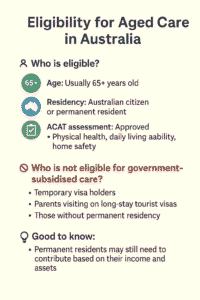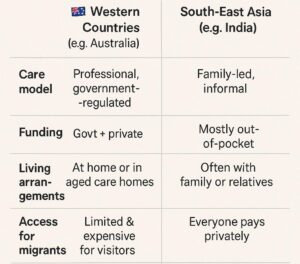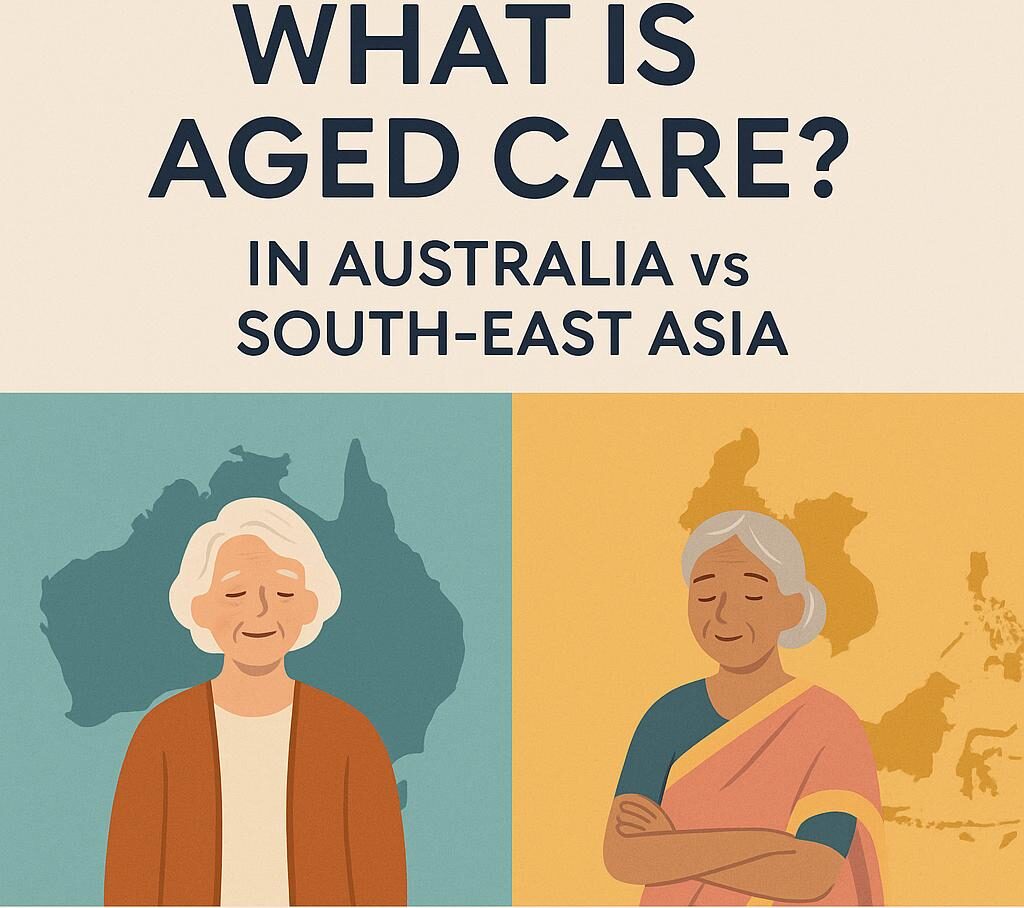“As our parents and grandparents grow older, they may start needing a little extra help — whether it’s remembering medications, preparing meals, or just having someone to talk to. That’s where aged care comes in.
How It Works in Western Countries vs. Southeast Asia?
Though the term “aged care” is more common in Western countries like Australia and the UK, the concept is not new to us. In India and other South Asian countries, we’ve always cared for elders at home, often calling them “Old Age Homes” when outside support is needed.
At its core, aged care is about dignity — it’s our way of giving back to those who raised us, with love and respect.
In countries like India, aged care has traditionally been family-driven. Elders usually live with their children, and it’s considered a matter of respect and duty to care for them at home.
But times are changing:
- Urbanisation, dual-income families, and migration make home care difficult
- More families are seeking help from home nurses, senior living apartments, and private old-age homes
- The idea of dignity in elder care is growing, though it’s still a sensitive topic socially.
🏡 What Does Aged Care Actually Mean?
Aged care can include:
- Personal help like bathing, dressing, or mobility
- Medical support, reminders, and daily medicines
- Nutritious meals and safe accommodation
- Companionship and emotional support
- 24/7 residential care in some cases (like nursing homes)
Whether it’s provided at home or in a dedicated care facility, the goal is to support elderly people in living safely and comfortably.
How it Works in Western Countries?
In countries like Australia, aged care is a professional system regulated and partly funded by the government. Services are tailored based on a person’s health, age, and financial needs.
Key types of support include:
- Home Care Packages – services delivered at home
- Residential Aged Care – 24/7 care homes with trained staff
- Subsidies – Based on income and eligibility
- ACAT Assessment – A government check to determine eligibility
Staff are usually qualified carers or nurses trained in elderly care. Importantly, the services aim to keep older people independent for as long as possible.
🛂 Can Non-Australian Citizens Access Elderly Care?
Generally, only Australian citizens and permanent residents are eligible for government-funded aged care.
However:
- Temporary visa holders and visitors are not eligible for subsidies
- They can still access private aged care, but must pay the full cost
- Humanitarian or special cases may be considered on rare occasions
So, if your parents are visiting or on temporary visas, aged care can become expensive unless privately arranged.
Aged Care in South-East Asian Countries (e.g. India, Philippines, Vietnam)
In countries like India, elderly care has traditionally been family-driven. Elders usually live with their children, and it’s considered a matter of respect and duty to care for them at home.
But times are changing:
- Urbanisation, dual-income families, and migration make home care difficult
- More families are seeking help from home nurses, senior living apartments, and private old-age homes
- The idea of dignity in elder care is growing, though it’s still a sensitive topic socially
Government support is minimal, and most services are privately funded. Social stigma still surrounds institutional care, but it’s slowly shifting.
🌐 Future – A Global Shift:
Both regions are undergoing change:
- Australia & West: Staff shortages are creating demand for migrant caregivers
- South Asia: Technology is making remote monitoring and telehealth easier
- Hybrid models: Combining love at home with trained external support is the way forward
Whether at home or in a facility, what matters most is that our elders feel safe, heard, and valued.
👩⚕️ Career Opportunity:
If you’re in nursing, health care, or personal support, aged care is growing rapidly — especially in Australia, Canada, and the UK. There are even visa pathways for trained caregivers from India and Southeast Asia.
💬 Final Thoughts:
No matter where we are in the world, aged care means one thing — honouring those who once cared for us. Whether it’s through professional services or family love, our elders deserve dignity, patience, and presence in their final chapters.
